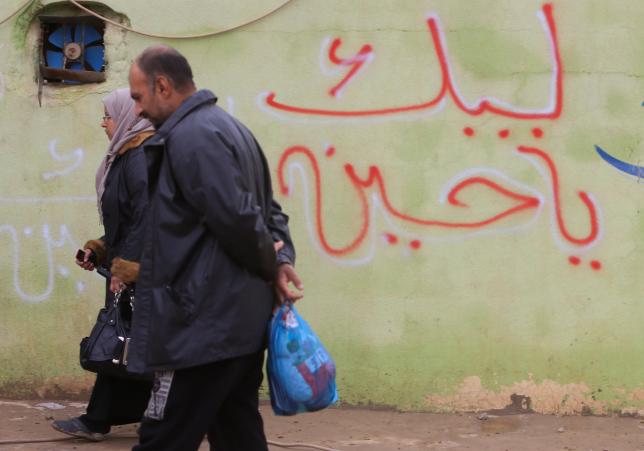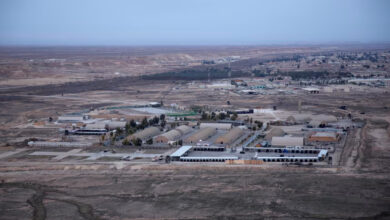
"We answer your call, O Hussein!"
The traditional battle cry of Shi'ite Muslims, expressing loyalty to the 7th century martyred hero of their sect, has been spraypainted across buildings in Mosul by soldiers as they push out the hardline Sunni fighters of Islamic State.
Troops and commanders say the slogan, sometimes sprayed over Islamic State's own graffiti, is meant to be an expression of victory for all Iraqis. But for many residents of the multi-ethnic but predominantly Sunni Muslim city, it is an explicitly sectarian taunt from the country's Shi'ite majority, signaling more violence to come.
"Look at this. The army should be neutral and not painting such things on walls," said Abdullah Shuwaib, a Sunni blacksmith who fled the fighting, pointing to a Shi'ite slogan painted next to a nearby grocery shop. "I'm not optimistic. Iraq won't improve after Daesh is gone."
Islamic State, also known as ISIS, ISIL or Daesh, considers all Shi'ite Muslims heretics who must repent or die. It declared a Sunni caliphate in 2014 after sweeping through the third of Iraq's territory where Arab Sunnis predominate, executing Shi'ite soldiers who failed to flee in time.
The militants were initially welcomed by some Sunnis who saw them as protectors from a Shi'ite-led government in Baghdad.
Today, most residents have nothing good to say about the fighters or their brutal rule, which included flogging people for smoking, enslaving non-Muslim women and executing dissidents. The soldiers driving them out have frequently been warmly welcomed.
But if the government is hoping to sustain such loyalty on the streets, troops seem to be undermining it with open displays of sectarian symbols.
"We will not allow anyone to drag the city into trouble," said a grocer who gave his name as Hisham, looking angry when asked about the slogans while gunfire rang in the distance.
"Sunnis, Shi'ites, Christians and Kurds, we all lived together in city without problems in the past," he said, drawing support form other bystanders. "We want a united Iraq."
Shi'ites revere Ali, the son-in-law of the Prophet Mohammed, and Ali's son, the prophet's grandson Hussein, as the prophet's true successors. The rift with Sunnis dates back to a 7th century battle when Hussein was betrayed and killed.
While Sunnis recognize Ali and Hussein as important historical figures, many consider the devotion expressed by Shi'ites to be sinful. Portraits of religious figures are generally forbidden in Sunni Islam, while images of Hussein are proudly displayed by Shi'ites.
A flag depicting Hussein was hoisted at the entrance of a Sunni mosque in Mosul's eastern Gogjali suburb, next to several shops and residential buildings scribbled over with "We answer your call, O Hussein".
More than a dozen residents said soldiers had painted the slogans after their arrival. Three Shi'ite soldiers from an infantry unit confirmed it, saying they had painted such slogans themselves or seen other soldiers doing it.
"PROTECTING IRAQ"
"Imam Hussein and Imam Ali are the most revered Imams in Islam," said one of them, standing next to a convoy. When asked whether he thought the slogans would spark sectarian tensions he said: "No. Shi'ites and Sunnis know that Imam Hussein is protecting Iraq from Daesh."
Next to him stood other Shi'ite soldiers, one wearing a green Shi'ite head banner, another a Barcelona soccer shawl. They said they came from the southern city of Nasiriya but did not give their names.
Reuters counted more than 30 military vehicles with flags showing Hussein or Ali over the past week of reporting in Mosul. There was a Shi'ite slogan and flag showing Hussein and Ali at an army checkpoint just outside Bartella, a town east of Mosul retaken in the early days of the offensive.
Washington, which helped train the army and is backing the military advance with air power and ground assistance, has pressed Baghdad to ensure that troops are seen as non-sectarian.
Mainly Shi'ite militia groups, which now have official status but are separate from the army, have joined the Mosul offensive but are being kept far to the west of the city itself.
Sabah al-Numan, spokesman for the U.S-trained Counter Terrorism Service leading the advance in eastern Mosul, said he did not know whether soldiers were behind the graffiti, but also excused such slogans as non-sectarian.
"Our soldiers are busy fighting Daesh. They have no time to write this," he said. "In any case 'We answer your call, O Hussein' is just an expression of joy over the liberation from Daesh. It's known that Imam Hussein is a symbol of the revolution from oppression."
While many residents looked apprehensive or annoyed when asked about the slogans, some tried to see a bright side.
"The slogans only show there is tolerance for all schools of Islam," said Ahmed Adel, a 17-year old high school student.




